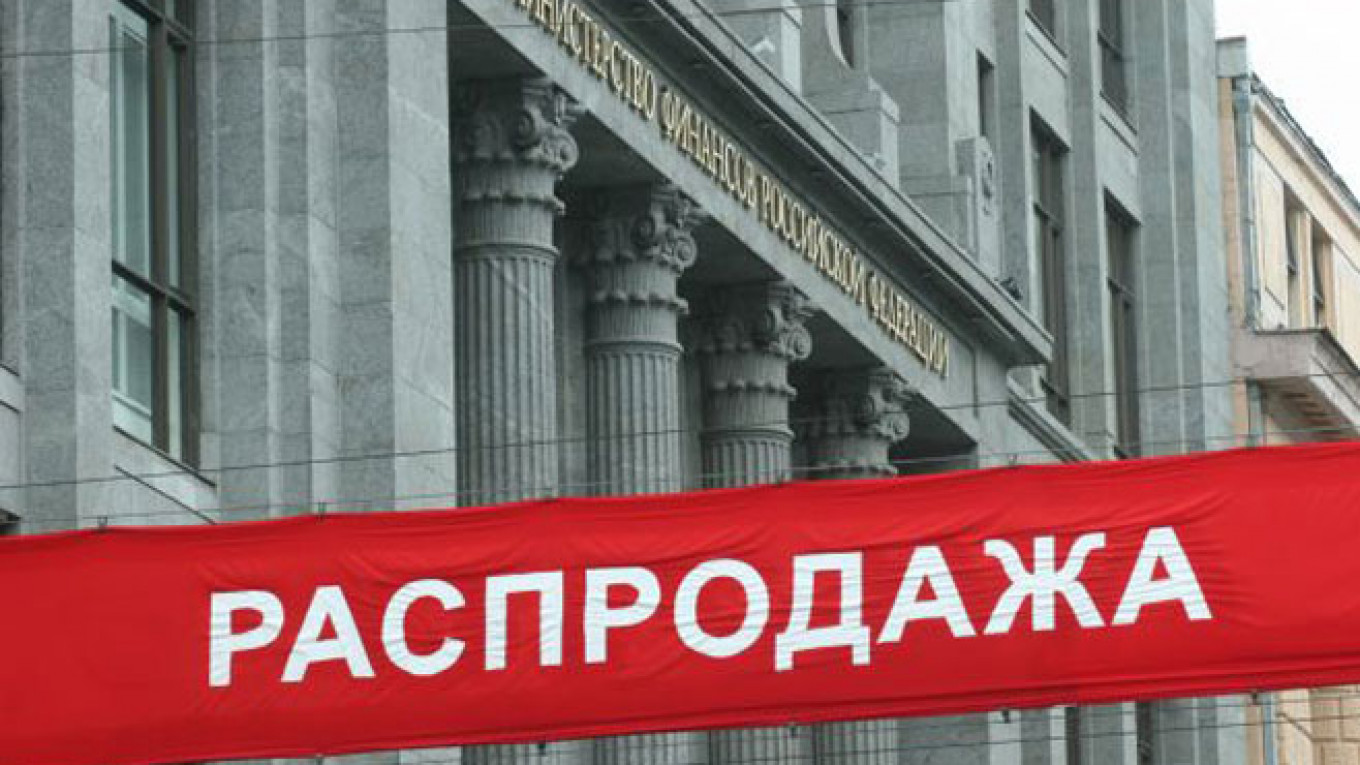
You know that Russia is in real trouble when liberal economic policies start getting batted around. This is particularly true of "privatization," a typically boring and technical term studiously avoided during periods of stability and then suddenly thrust back into the public consciousness during periods of crisis.
In 2009, the last time that oil prices tanked and the government's coffers became a bit sparse, the Kremlin talked openly about privatizing a number of state-owned companies. Impressive sounding plans were released, and officials mouthed the pieties about "attracting investment" and "improving efficiency." Nothing came of this campaign (oil prices rebounded quickly enough that the pressure on the state's finances quickly abated and the state's economic role actually grew), but it established a precedent that is being repeated.
As the economy experiences a nasty recession and pressure on the government's budget mounts, the Kremlin is once again mulling the initiation of a large-scale program of privatization.
Both in 2009 and in 2016, the official justification for privatization is familiar: privatization will both raise money to plug holes in the budget and, perhaps even more importantly, will make the economy as a whole more competitive. It's no secret that government-owned companies almost always lack the incentives needed for long-term profitability.
Compared with private sector peers, state-owned firms tend to have some combination of bloated payrolls, unrelated assets (think golf courses), or suspiciously large capital expenditures.
For example, in recent years Gazprom's capex as a percentage of sales was somewhere between three and four times the level of comparable publicly-traded companies. If you abstract a comparable level of inefficiency to the dozens of other state-owned firms throughout Russia, then tens of billions of dollars a year are being put to no productive use. It's easy to imagine that more profit-oriented managers would do a better job.
If the government's main goal is to increase the economy's efficiency, privatization is an excellent tactic. But, rare indeed is the instance in which a government single-mindedly pursues greater efficiency. More often, there are numerous other priorities in question — some at least, if not more important than increasing state-owned companies' profits.
According to the Kremlin's public statements, privatization is going to achieve the following goals simultaneously: 1) increase the economy's competitiveness, 2) raise funds to plug the hole in the budget, 3) maintain state control of "strategically important companies," 4) avoid a "fire sale" in which the government "gives away" valuable assets, 5) limit the involvement of state banks and 6) attract foreign investors.
It is simply impossible to design a privatization scheme that achieves all of these goals simultaeously. The government could ensure sales at a high price while allowing state banks to play a large role, but this is unlikely to improve competitiveness. Indeed it's unclear whether this would be "privatization" — ownership could be technically private, but taxpayers, via Sberbank and VTB, would retain a stake in large loans.
Alternately, the government could drastically limit the involvement of state banks. This would likely improve the quality of management but would significantly depress valuations (Western banks still can't lend to Russian companies) and, thus, proceeds from any sales.
Unless the government significantly changes its stated goals, foreign investors will remain uninterested. Particularly if state media reports are true and any new owners of privatized firms must be subject to Russian jurisdiction. This would drastically limit interest by foreign investors wary of Russia's legal system.
The Russian government needs to decide what it values most highly. Does it want to involve foreigners or keep everything registered in Russia? A properly-structured program of privatization would marginally boost the country's growth rate and bring in fresh management, but would require such economic de-regulation that, by all accounts, the Kremlin deems unacceptable.
So what is to happen? It would be nice if the economic reins were loosened, but I don't see that happening until all other options have been exhausted. And while the economy's footing isn't solid at the moment, the Kremlin is at least a few years away from having its hand forced by a systemic financial crisis.
I would expect a reprisal of 2009's performance — self-satisfied talk of privatization with very little action. The real question is whether oil prices will rebound like they did last time.
Mark Adomanis is an MA/MBA candidate at the University of Pennsylvania's Lauder Institute.
A Message from The Moscow Times:
Dear readers,
We are facing unprecedented challenges. Russia's Prosecutor General's Office has designated The Moscow Times as an "undesirable" organization, criminalizing our work and putting our staff at risk of prosecution. This follows our earlier unjust labeling as a "foreign agent."
These actions are direct attempts to silence independent journalism in Russia. The authorities claim our work "discredits the decisions of the Russian leadership." We see things differently: we strive to provide accurate, unbiased reporting on Russia.
We, the journalists of The Moscow Times, refuse to be silenced. But to continue our work, we need your help.
Your support, no matter how small, makes a world of difference. If you can, please support us monthly starting from just $2. It's quick to set up, and every contribution makes a significant impact.
By supporting The Moscow Times, you're defending open, independent journalism in the face of repression. Thank you for standing with us.
Remind me later.






